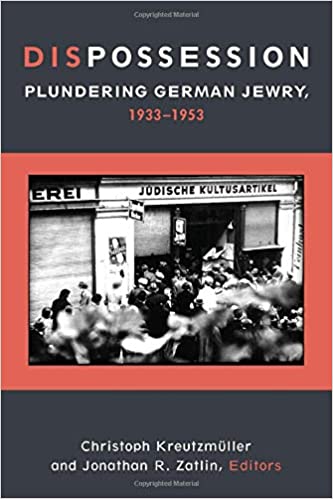Jonathan Zatlin on Jewish Dispossession
New publication by Jonathan Zatlin (HI) and Christoph Kreutzmüller – Dispossession: Plundering German Jewry 1933-1953 (University of Michigan 2020)

Dispossession: Plundering German Jewry, 1933 -1953, a work edited by BU Associate Professor of History and 2018 BUCH Jeffrey Henderson Senior Research Fellow Jonathan Zatlin and Senior Historian of House of Wannsee Conferences Christoph Kreutzmüller, was just published by University of Michigan press in September 2020. A collection of essays written by a range of international scholars, Dispossession examines the myriad ways in which German Jews were robbed over the course of two decades.
Zatlin previously presented work on theft against German Jewry at a 2014 conference (also titled Dispossession) sponsored by the Elie Wiesel Center for Jewish Studies, the BU Center for the Humanities, the Florence and Chafetz Hillel House, the BU Department of History, Kilachand Honors College, the German Historical Institute in Washington, D.C., and the Memorial Museum at the House of Wannsee Conference. Promotional materials for the conference note the irony of the Nazi stereotype of a thieving Jewish people, when in fact the Jews were victim to theft of their rights, properties, and lives at the hands of the Nazis.

Amplifying the ideas of this conference, Dispossession addresses the underlying significance of the financial, social, and cultural theft that German Jews faced. While restitution has been primarily addressed within a legal framework, Dispossession addresses the problem of restitution from a historical perspective. Many of the essays explore topics not previously written about, including an estimate of Jewish wealth prior to the war that dispels myths about Jewish affluence and a description of a ruse that Adolf Eichmann invented to rob elderly Jews. While the book focuses on multiple kinds of thefts, the individual parts together serve to reveal a cohesive narrative, prompting University College London Professor Michael Berkowitz to describe Dispossession as “among the more integrative works” dealing with the Holocaust.
Zatlin sums up the core of Dispossession saying that the work “links belonging with belongings – citizen rights with property rights.” By examining multiple types of theft, Zatlin and Kreutzmüller’s work illuminates the many dimensions of the economic racism perpetrated against the Jewish people.